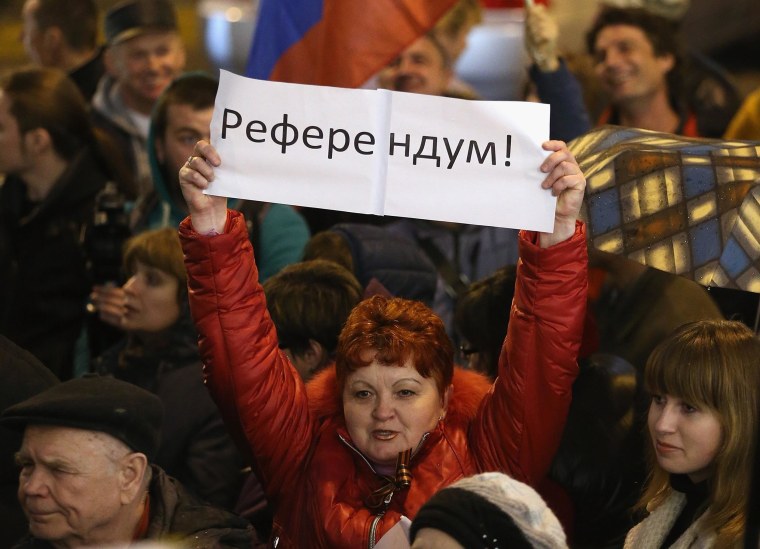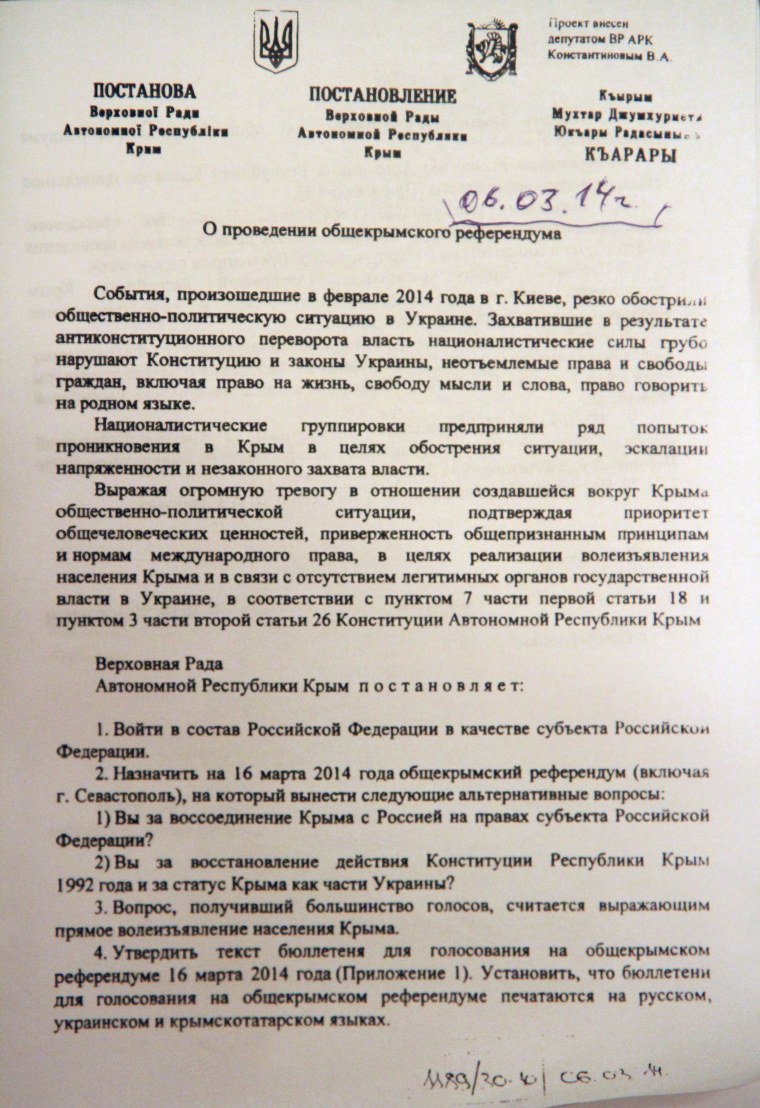SIMFEROPOL, Ukraine — Crimeans will face a stark choice when their region's future is put to a vote in just nine days.
A copy of a referendum document obtained by NBC News reveals the questions the primarily pro-Moscow region's more than one million residents will be presented with at the ballot box on March 16.
- Are you in favor of reuniting Crimea with Russia as a citizen of the Russian Federation?
- Are you in favor of Crimea staying with Ukraine on the condition it rolls back to its 1992 Constitution?
In a nutshell, they will decide whether to become citizens of Russia or to remain within Ukraine but with enhanced autonomy.
A member of Crimean parliament, which voted to join Russia on Thursday and set the wheels in motion for the referendum to be held within 10 days, said the key to the motion was greater independence for Crimeans.
“The Constitution of 1992 was the best constitution Crimea ever had,” Gennadiy Babenko said in an interview with NBC News. He added that under those laws, money earned from Crimeans through taxes and industry stayed in the Crimea, while money sent by the capital, Kiev, was spent to subsidize government.
The parliament also announced it had voted for the creation of a slew of new governmental ministries that would be independent of Kiev — including energy, internal affairs and justice.
Holding a region-wide referendum on the future of the peninsula in just over a week’s time is a daunting undertaking.
A worker at City Hall in the Crimean capital, Simferopol, told NBC News that such elections typically take weeks if not months to properly set up. But for this vote the first deadline was March 10, when the region expects to complete updating its voter records for the entire region and establish election committees.
“By March 10 we hope to complete the organization of local and territorial election committees,” said Babenko, who is a representative on the parliamentary committee behind the referendum. "We also plan to have finalized our voter lists based off those from 2010 and 2012 elections.”
Election officials were set to visit 1.2 million voters across the Crimean peninsula, not including the port city of Sevastopol, which maintains its own voter records but will hold an referendum as well. Election committees will go from home to home to update voter lists and register those too sick or disabled to make it to a voting center so that special ballot teams may visit them at home to assist in casting their ballots.

If all goes as planned, voters would be presented with a ballot in three languages – Russian, Ukrainian and Crimean Tatar.
There are stumbling blocks, of course.
Should Crimea vote in favor of remaining part of Ukraine, it will be conditional on the new government Kiev accepting a rollback to the 1992 Constitution or some sort of other compromise that affords greater authority to the peninsula. Already, Ukraine's new leaders have said they would vehemently oppose the move.
International law, which makes it hard for regions to secede without the consent of the country they try to break away from, as well as the U.S.and Europe's opposition to Crimea's joining Russia, could also hinder the move.
Finally, not everybody in Crimea wants to join Russia. The speaker of the Tatar National Assembly, Refat Chubarov, on Thursday called for a boycott of the referendum, which he said “completely ignores the opinion of the peninsula’s native population – the Crimean Tatars,” makes the vote almost a foregone conclusion.
Babenko nevertheless was upbeat, and pointed to the examples of Catalonia's separatist movement and the looming Scottish independence vote as examples of referendums that would be followed by difficult transition periods that could last years.
And given the demographics of Crimea, which is 60 percent Russian, and that only 50 percent of the population needs to vote in the referendum to make it valid – experts say it’s likely that the vote will go in Russia’s favor.
The Russian Parliament or Duma will first need to vote on Crimea’s request to be accepted into its federation of states. A recent law passed by Russia’s Duma that paves the way for states that share a border with the country to join the Russian state suggests that vote will also go in Crimea’s favor.
If Russia’s Duma accepts Crimea’s request and Crimeans vote in favor of joining Russia, what will likely follow is an extended transition period where a host of issues ranging from property, currency and banking will need to be smoothed out.
With a likely outraged Ukrainian government also throwing diplomatic and legal wrenches into what they view as an illegal, unconstitutional act by the Crimeans, the difficulty of pulling off a referendum in such a short time pales in comparison to the long diplomatic fight that will follow any vote.
Alexey Furman of NBC News contributed to this report.
